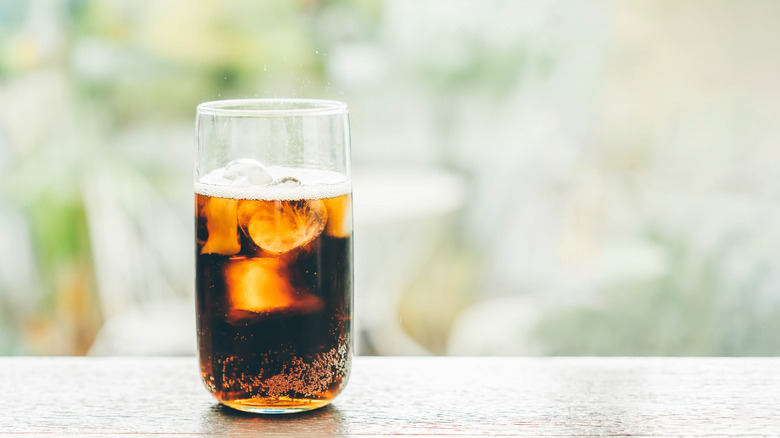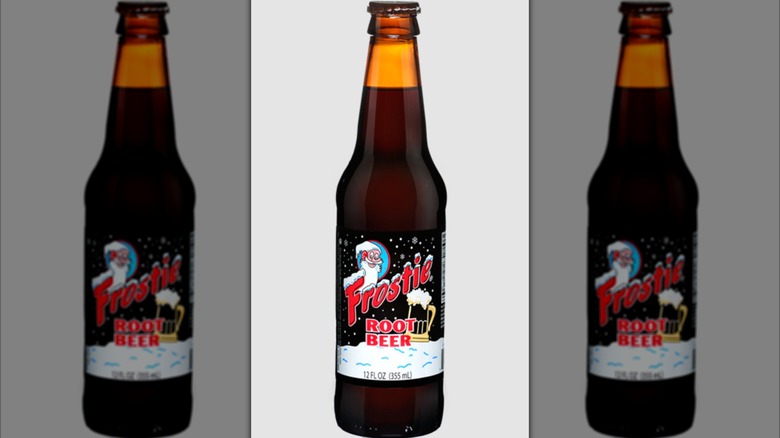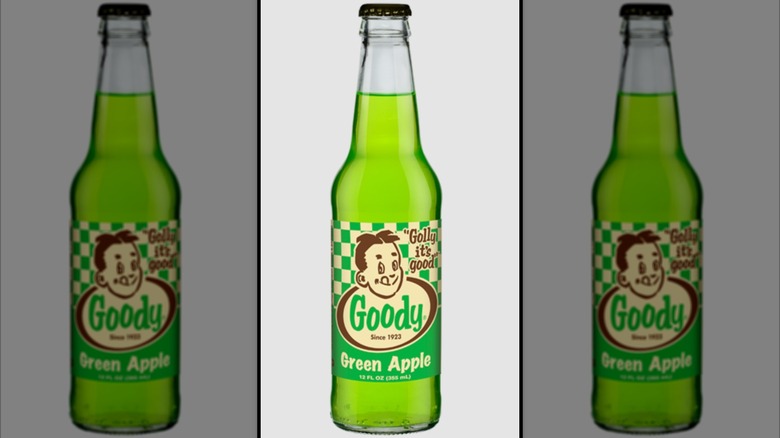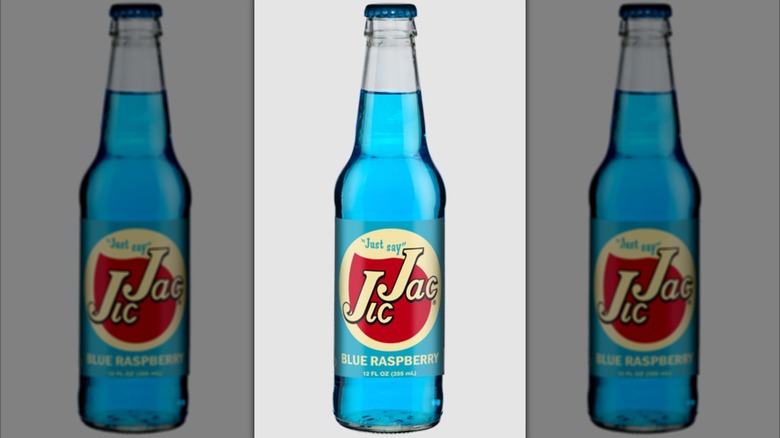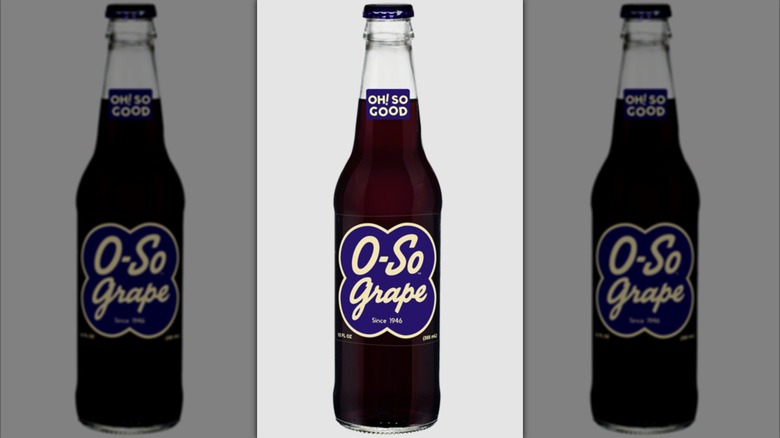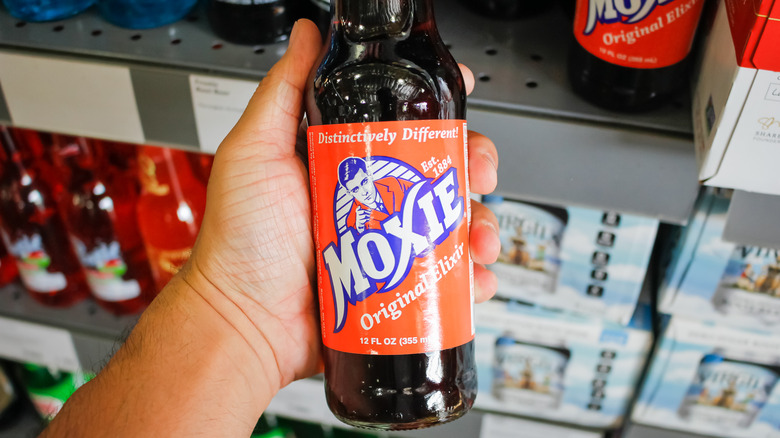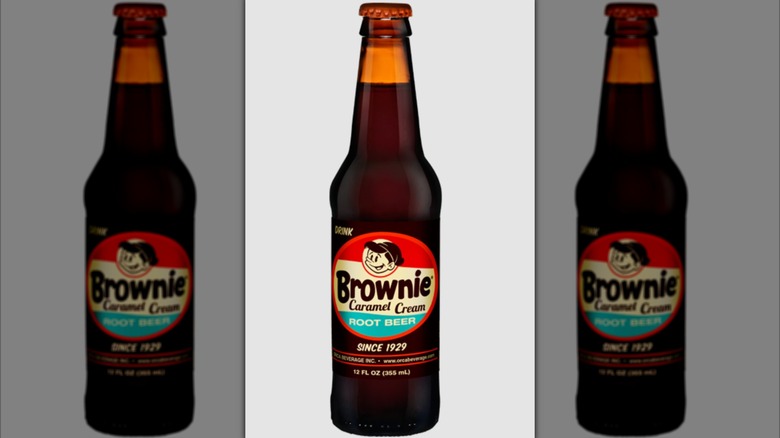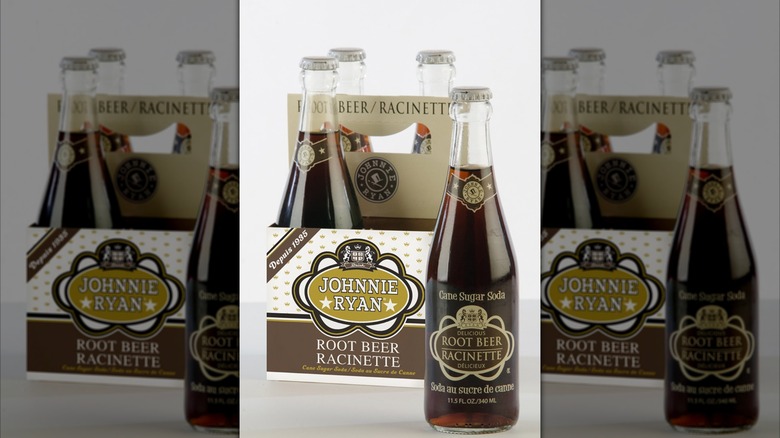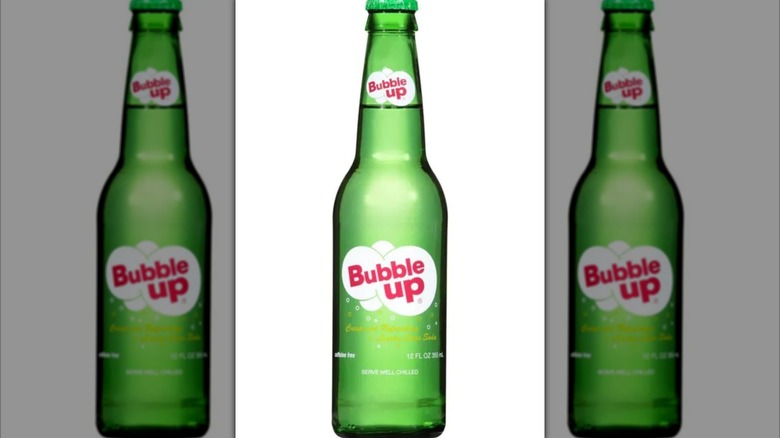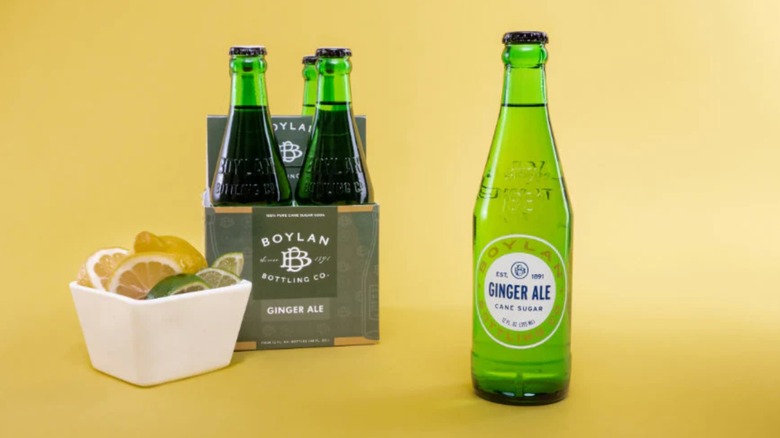Once-Popular Vintage Sodas You Probably Forgot About
Soda has been around almost as long as the United States has. It was first invented in 1767 and commercialized shortly after, with Schweppes, the oldest brand of soda that you can still find at the grocery store, being made since 1783. With a history that spans over 250 years, it's therefore no surprise at all that there have been a lot of soda brands along the way. However, if you think about the naming all the sodas you actually know, you can probably count them on two hands: Once you get past Coke, Pepsi, 7-Up, and Mountain Dew, things start to get a little tricky, right? There have been dozens, if not hundreds of these products, and yet we barely remember any of them.
Perhaps that's because there's not a lot you can do with soda, and different sodas can often blur together. Once you get beyond classic flavors such as cola, lemon, lime, root beer, and cherry, it can be hard to find innovative choices that stand out from the pack. It may also be because the soda market is pretty tough, with competition being nudged out and flattened by massive soda producers. Whatever the reason these vintage sodas lost their way, we're determined to bring them back to your attention.
Frostie
In 1939, an enterprising businessman named George Rackensperger decided that it was time to make a mark on the soda world. The result was Frostie, a root beer that started life in a Baltimore suburb before expanding across the country. Its name spread primarily by word-of-mouth, with folks clearly falling in love with its sprightly flavor, and a franchising effort meant that it was able to rapidly expand during the 1940s. By the end of the decade, it was available in nearly every state with multiple bottlers cranking out soda to fill the demand.
Although Frostie was originally a root beer, over time the brand began to incorporate different flavors such as orange, Concord grape, and blue cream into its repertoire. It also became known for its Christmas-themed artwork, a trend that it continues to this day, with a cartoon Santa on its label and a glass of root beer nestled in a pile of snow. It may well be that this annual practice somewhat got in the way of the drink, as it definitely has the feel of a holiday or novelty beverage — and that, combined with the brand changing hands several times, could be the reason why it gradually faded from public view. The drink can be found today, but only in choice locations or through specialist distributors. Plenty of people won't know it even exists. That's a shame, as it's perfect for a grown-up root beer float.
Goody
Head to South Omaha, Nebraska, and you can get a piece of soda history. This was the home of Goody, a vintage soda that came in a range of distinctive flavors — at one point it had 24 different varieties in its product line. The company that made Goody, Willow Springs Bottling, started life as a distillery and was once the third-largest in the country. While some of America's oldest distilleries survived through Prohibition, Willow Springs pivoted to soda production, and Goody was one of its flagship offerings.
Goody was advertised with the help of a cartoon image of a little boy (also named Goody) on its label, and the slogan "Golly it's good!" became a well-known refrain for the drink. Eventually, Willow Springs Bottling went out of business, and Goody died with it — until the 2010s, when the soda made a comeback thanks to Orca Beverage Inc. You can currently find four different varieties of Goody: Berry Cream, Green Apple, Pineapple, and Bubble Gum. However, it's really only something that you can find online these days, and you'll have to head to Orca's website if you want to try them.
Jic Jac
If you're looking for a soda with a catchy, slightly annoying name, then Jic Jac is the one for you. Manufactured by the Jic Jac Company, this soda began its life in St. Louis, Missouri. Soon enough, the entire country caught onto its taste, and it was sold across the United States. This was a classic 1950s soda, complete with catchy, not-at-all-annoying slogans to sell it like "Pick a Pack of Jic Jac" and "Just say Jic Jac." It may not have been an elegant way to advertise the product, but it kind of worked — it was catchy!
Jic Jac was known for its unique container design, which was somewhere between a bottle and a can. Its flavors (which included root beer, orange soda, and grape soda) came in cone top style metal bottles that almost looked like canisters and were adorned with colorful labels. You can still find Jic Jac today in regular bottles, but it's one that soda aficionados will have to hunt down online. If you expect to find it in your local Walmart, you'll be disappointed.
O-So
Looking for a vintage soda that's oh, so tasty? Then O-So is the one for you. O-So was established in 1946 and was originally bottled out of Chicago. Its flagship product, O-So Grape, was the one that really solidified its name, and soon enough O-So was making a ton of other varieties. As you might expect, it leaned heavily on its name to sell its product, with "O-So Good" and "O-So Delicious" being just two of the taglines used. It also sold its wares due to its super-sweet taste, with the drink using pure cane sugar for a slightly more natural edge.
O-So used to have a fairly big presence in the soda world, but before long, its star started to wane. More recently, though, the brand has been picked up by Orca Beverage. Founded by Mike Bourgeois, Orca has a mission to revive old-time retro drinks like O-So in a bid to diversify the soda market and give customers a taste of the past. It now has over 100 retro and specialty sodas in its portfolio, and you can find them all online. And bonus for you, it's soda flavors like these that can be a game-changer when added to boxed cake mix.
Moxie
To drink Moxie is to engage in soda history. This soda has been pleasing taste buds across the land since 1885 and recently celebrated its 140th birthday, making it one of the oldest soda brands out there. Moxie was first created in Maine by Dr. Augustin Thompson, and it was originally marketed as a medicinal drink, more specifically as a nerve tonic that promised to cure whatever ailed you, including a "loss of manhood" and a "softening of the brain." This medicinal nature was matched by a medicinal flavor, with a bitterness provided by gentian root extract.
Moxie has been continually produced since its inception, but it used to be a way bigger deal than it currently is. In 2005 it received a much-needed shot in the arm when it was designated as Maine's official soft drink, but that didn't result in the soda becoming as big as some of the major players. It doesn't look likely that it will disappear any time soon, though: It's now produced by Coca-Cola. And while the company doesn't make a huge effort to promote Moxie, the backing of such a major player will keep it safe — for now, at least.
Brownie
The late 1920s and early 1930s were a great time for soda. This period saw a bunch of new soda brands hit the market, and Brownie, a caramel cream root beer soda, was undoubtedly one of the cutest. First produced by the Atlas Beverage Company around 1929, this Michigan-based drink was well-known throughout the state, partly due to its bright, colorful label and cartoon mascot. While Brownie started with caramel cream root beer soda, the flavor that undoubtedly made its name, it soon branched out into other varieties such as cream, strawberry, and bulldog ginger beer.
Brownie remained a family affair until 1996, when the founder's sons closed the original plant and shut up shop. The property that housed its production was eventually torn down and turned into a strip mall. It seemed like that was the end for Brownie, until vintage soda company Orca Beverage came along and revived the soda as part of its portfolio. It's not cheap to purchase these days (a case of 12 bottles costs a whopping $55 online), but if you want to try a blast from the past, it's the soda for you.
Johnnie Ryan
Talk about a soda with a cool name, right? Johnnie Ryan sounds more like an action hero than a fizzy drink brand, but instead of a tough guy coming to fight crime, you get a beverage sweetened with 100% cane sugar. Johnnie Ryan Bottling Company was founded in 1935 by brothers Stephen, Walter, and John Janik, and the Western New York outfit was soon making a splash in the local area. Its drinks are still made in Niagara Falls, New York, to this day, and it remains a resolutely family affair, with the third generation of Janiks now running the ship.
Everything about Johnnie Ryan drinks screams vintage. As well as the use of cane sugar (an underrated type of sugar, in our opinion), every drink is housed in a glass bottle, with its four-packs coming in a delightfully retro cardboard carry case. Cola, ginger ale, root beer, orange, and blue raspberry are just a few of the flavors in its product line, which currently spans 11 different varieties. It's the kind of drink that you really have to seek out, but you'll be thankful once you do: It's pretty delicious.
Bubble Up
If you want to try an underdog, you need to grab a bottle of Bubble Up. The soda was first produced in 1919, and it was an early example of a lemon-lime flavored carbonated beverage. So early, in fact, that it was around a full decade before its most famous competitor came along — that's right, folks, we're talking about 7 Up. Bubble Up was once the better-known of the two drinks, but after 7 Up started to catch fire, there was no stopping it. It shot to the top of the pack, and Bubble Up was left in the dust.
Despite this, it has managed to stay in production. Sales peaked in 1961 with about 20 million cases. It's far from an unknown drink today, but the decades have not been too kind to the brand, which has been unable to keep up with the rapid pace of soda production. Today it's licensed to The Dad's Root Beer Company by Hedinger Brands, and it's pretty difficult to find in anywhere but the most specialized of stores. If you can, though, grab yourself a bottle and compare the two drinks. You might just find your new favorite.
Boylan Bottling Company
There are tons of soda companies out there that have stood the test of time, and while they may not be as big as they once were, they still manage to keep afloat in a wildly cut-throat market. Boylan Bottling Company is one such soda company. Boylan was founded in 1891, when pharmacist William Boylan first created a birch beer that he sold as a health drink. Boylan's Birch was a hit, and it was produced until Prohibition put a stop to its sale. However, once that period was over, Boylan's Birch began to recirculate, and Boylan Bottling Company also saw a gap in the market for soda production.
It soon began making a range of soda flavors, including root beer, ginger ale, and black cherry. It still makes those flavors to this day, along with a host of other varieties, including a bottled Shirley Temple. Boylan Bottling Company has also branched out into mixers and a range of sparkling fruit drinks known as Mash. Oh, and its birch beer is still proudly on sale in its online store, in case you wanted to try the drink that made this brand's name.
